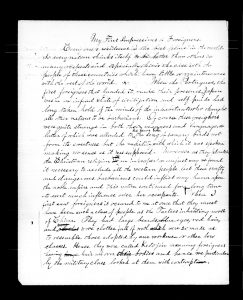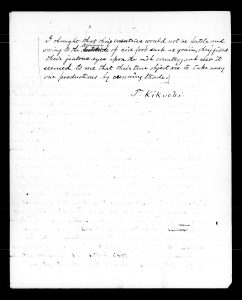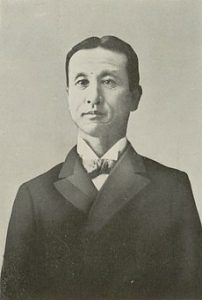T. Kikuchi


My First Impressions of Foreigners
(Transcribed by Rachelle Cha and Shrusti Goswami)
Every one’s residence is the best place in the world. So every nation thinks itself to be better than others in many respects and especially this is the case with the people of those countries which have little or no intercourse with the rest of the world. When the Portuguese, the first foreigners that landed it, made this their presence, Japan was in an infant state of civilization and self-pride had long taken hold of the minds of the inhabitants who thought all other nations to be barbarians. Of course, these foreigners were quite strange in both their manners and language, the latter of which was alluded to, as being like the song of canary birds not from its sweetness but the rapidity with which it was spoken making no sense as it was supposed. Moreover, as they planted the Christian religion in an improper or unjust way we found it necessary to exclude all the western people lest these crafty and dangerous barbarians could inflict any harm upon the noble empire and this notion continued for a long time to exert much influence over her occupants. When I first saw foreigners it occurred to me at once that they must have been such a class of people as the Tartars inhabiting north of China. They had large beards, blue eyes, red hair, and wore clothes full of wool which were so made as to resemble those adopted by our workmen or other low classes. Hence they were called Ketojin meaning foreigners having hair all over their bodies and hence we particularly by the military class looked at them with contemption.
I thought that their countries would not be fertile and owing to the deficiency of nice food such as grains, they fixed their jealous eyes upon the rich country; and also it seemed to me that their true object was to take away our productions by cunning trade.
T. Kikuchi
-
Kikuchi Takeo 菊池武夫 (1854-1912)
 Kikuchi Takeo was born in Iwate as a son of a vassal of the Morioka Domain. He graduated Daigaku Nanko in 1875, and was sent to the U.S. as a ryugakusei by the Ministry of Education. Upon return after studying at the Law School of Boston University, he served as the Secretary of the Minister of Justice, became a member the committee for drafting civil law, and later opening his own law office. He was one of the foundiers of what later becomes Chuo University and served as its first president. He was elected member of the House of Peers in 1891 and served as a member until his death.
Kikuchi Takeo was born in Iwate as a son of a vassal of the Morioka Domain. He graduated Daigaku Nanko in 1875, and was sent to the U.S. as a ryugakusei by the Ministry of Education. Upon return after studying at the Law School of Boston University, he served as the Secretary of the Minister of Justice, became a member the committee for drafting civil law, and later opening his own law office. He was one of the foundiers of what later becomes Chuo University and served as its first president. He was elected member of the House of Peers in 1891 and served as a member until his death. -
I thought this essay by Kikuchi was very interesting. Kikuchi was insightful in his observation about how other countries say they are the best but have not had much contact with the outside world. He feels as if Western countries made unfair judgments on other countries such as Japan. He also describes foreigners as strange and making no sense. Kikuchi most likely thinks that Westerners are too different from Japanese people. The cultures are vastly different, as Eastern cultures focus on collectivism while Westerns are all about the individual. This makes Western culture hard for Kikuchi to understand because everything Westerners do can seem selfish and disrespectful due to the ideals of individualism they follow.
Kikuchi also says that Christianity was spread in an “improper or unjust way. ” He believes that it hurt the empire of Japan. The spread of Christianity also ruins the way of life in Japan. Before the spread of Christianity, people followed other religions such as Buddhism and Shintoism, which did not have a central deity. On the other hand, Christianity has one god which draws attention away from the emperor which disrupted the way of life in Japan. The Westerners tried to use Christianity as a way to exert influence on the Japanese, which Kikuchi did not approve of.
Kikuchi also noted that the Westerners were dressed like lower-class Japanese men. However, Kikuchi finds that these men are not poor. They are greedy and wealthy nations that want to dominate the world by colonizing every country they can. Westerners want to control trade and leverage power over other countries to continue to get stronger. Kikuchi notices that their real motive is trade. They use a peaceful reason, such as Christianity, as a cover for their greediness. Overall, Kikuchi seems to have a more negative skewed overview of foreigners because they try to disrupt Japan with Christianity, are too prideful, and control trade.
-
Reading this essay was like a direct look into history. It is interesting to see, not only how Japan as a country perceived foreigners but how Japanese students and individuals viewed foreigners’ places in society. This essay by T. Kikuchi can give insight into his thoughts on foreigners and how his opinion was based on previous examples and interactions with foreigners in Japan and other countries.
To begin, T. Kikuchi states that “every nation thinks itself to be better than others in many respects and especially this is the case with the people of those countries which have little or no intercourse with the rest of the world..” This statement is very objective in a sense and actually can reflect negatively on Japan. While part of his essay is arguably anti-foreign, this opening statement shows how Japan is also at fault for believing they are superior to the West. Whether he intended to or not, Kikuchi sets up a debate in readers’ minds about whether or not foreigners’ representation in the world is as “barbaric” as the Japanese claim, as they are guilty of having little intercourse with the outside world.
Kikuchi moves on to make observations about foreigners. One that I found particularly interesting was comparing the way the Portuguese talk to canary birds in how they speak rapidly and senselessly. Although this is a bias observation, I believe it gives insight into how Kikuchi negatively viewed the arrival of foreigners. It also shows how observant he was in certain aspects of foreign behavior. Kikuchi also mentions how the Portuguese took advantage of Japan when they were in an “infant state” and how Japan’s future actions of banning Christianity were to protect the people from harm. This gives insight into how Kikuchi viewed religious freedom, which was relatively in line with how much of Japan also viewed religious freedom until sometime after 1873. It’s interesting to read Kikuchi’s thoughts on religion as he only presents one side. Like many of the topics he mentions in his essay, there is little acknowledgment of the other side, which can show how firm Kikuchi was in his beliefs.
Kikuchi begins to wrap up the essay by comparing the foreigners he sees to “a class of people as the Tartar’s inhabiting north of China. They had large beards, blue eyes, red hair, and more clothes full of wool which were so made as to resemble those adopted by our workmen or other low classes.” Kikuchi proves here that he is knowledgeable of foreign presence in other nations and also vividly describes what these foreigners look like. His description can tell us that the distinct difference in appearance between himself and these foreigners caused him to be unsettled. In the following sentence, Kikuchi identifies himself as a military man who looked at foreigners with contempt. The class difference between Kikuchi and the foreigners may be a reason for his objection to their arrival as well.
Kikuchi leaves us by describing foreigners as jealous because they are only interested in taking products via “cunning trade.” This opinion seems sudden in his essay as he hasn’t discussed much about trade before. However, I can see by following the essay that Kikuchi begins to open up more and more about his opinion of foreigners throughout the paper. He seems to start out with small observations and ultimately works his way to broad generalizations. While we must question which parts of Kikuchi’s opinions are based on facts and which parts aren’t, this direct piece of history shows his individual take on foreigners—a valuable resource. It also allows us to see what people in Kikuchi’s position may have believed as well, and how their individual opinions may have created a certain view of foreigners for all of Japanese society.